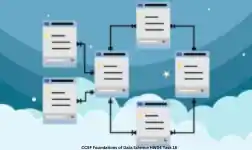
Introduction to the CCSF Foundations of Data Science HW04 Task 18
Data science is an ever-evolving field that demands a solid foundation to navigate its complexities. For students at City College of San Francisco, the CCSF Foundations of Data Science HW04 Task 18 serves as a crucial stepping stone in this journey. Whether you’re just starting out or looking to sharpen your skills, understanding this task can set you on the right path.
In this blog post, we’ll delve into what makes Task 18 so essential for aspiring data scientists. From grasping core concepts to overcoming common challenges, you’ll find everything you need to tackle this assignment with confidence. Ready to enhance your skill set? Let’s dive in!
Understanding the importance of task-based learning in data science
Task-based learning is a powerful approach in data science education. It allows learners to engage with real-world problems, fostering critical thinking and problem-solving skills.
By tackling specific tasks, students can directly apply theoretical concepts. This method bridges the gap between knowledge acquisition and practical application.
Moreover, task-based learning encourages collaboration. Working on projects often requires teamwork, simulating real-life data science environments where communication is key.
Feedback plays an essential role too. Students receive immediate insights into their work, allowing them to refine their skills quickly.
This hands-on experience builds confidence as learners see their efforts yield tangible results. In a fast-evolving field like data science, adapting through practice becomes invaluable for future challenges and opportunities.
Overview of HW04 Task 18 and its objectives
HW04 Task 18 is a pivotal component of the CCSF Foundations of Data Science course. This task encourages students to apply practical skills in data analysis and visualization.
The main objective is to engage with real datasets, allowing learners to extract meaningful insights. Participants will work on various analytical techniques, enhancing their understanding of data manipulation.
Students will also focus on crafting visual representations that effectively communicate findings. This not only aids comprehension but also prepares them for future projects where presenting data clearly is essential.
By completing this task, participants will solidify foundational concepts while developing critical thinking skills necessary for tackling complex problems in data science. Engaging with this assignment sets the stage for more advanced topics down the road.
Step-by-step guide on completing the task
To tackle the CCSF Foundations of Data Science HW04 Task 18, start by carefully reading the task requirements. This initial step sets a clear direction.
Next, gather your data sources. Make sure you understand what tools and datasets are provided. Familiarize yourself with them; this knowledge will be crucial.
Once you’re set up, begin analyzing the data. Don’t rush through this part—take time to explore patterns or anomalies that may arise.
As you proceed, document every step meticulously. Maintaining clear notes helps clarify your thought process and can aid in troubleshooting down the line.
After analysis comes interpretation. Think critically about what your findings mean in context of the task objectives.
Review your work against the original requirements before submission to ensure everything aligns perfectly with expectations.
Common challenges faced and how to overcome them
Data science can be daunting, especially when tackling CCSF Foundations of Data Science HW04 Task 18. One common challenge is understanding the requirements. It’s crucial to read the instructions carefully and break them down into manageable parts.
Another hurdle involves data manipulation and analysis. Students often struggle with using libraries like Pandas or NumPy. To overcome this, practice small projects that focus on these tools before diving into complex tasks.
Time management also poses a significant issue. Many learners underestimate how long it takes to complete each section of the task. Setting specific deadlines for different components can help maintain momentum.
Debugging errors in code can be frustrating. Instead of getting discouraged, take a step back and review your logic systematically or seek help from online forums and classmates who might offer fresh insights.
The significance of mastering this task for future data science projects
Mastering CCSF Foundations of Data Science HW04 Task 18 is a pivotal step for aspiring data scientists. This task lays the groundwork for understanding real-world data challenges.
Completing it equips students with essential analytical skills. These skills are crucial when tackling future projects, making it easier to interpret and manipulate complex datasets.
Moreover, this task fosters critical thinking and problem-solving abilities. Engaging deeply with the material encourages innovative solutions that can be applied beyond academia.
As data science evolves, staying current with foundational tasks ensures adaptability in an ever-changing field. The insights gained here serve as building blocks for more advanced concepts down the line.
Incorporating lessons from this assignment into your workflow elevates project quality significantly. It prepares you to address various scenarios effectively in your professional journey ahead.
Conclusion and key takeaways
Mastering the CCSF Foundations of Data Science HW04 Task 18 is a pivotal step in your data science journey. This task not only enhances your technical skills but also reinforces the significance of hands-on learning in this field.
Key takeaways include understanding how to effectively approach task-based assignments, identifying common challenges, and developing strategies to overcome them. Learning from these experiences will undoubtedly prepare you for more complex projects ahead.
Embrace each part of this task with curiosity and diligence, as every challenge faced is an opportunity for growth. As you continue exploring data science, remember that practice, persistence, and problem-solving are essential components for success in any future endeavor within this dynamic discipline.






